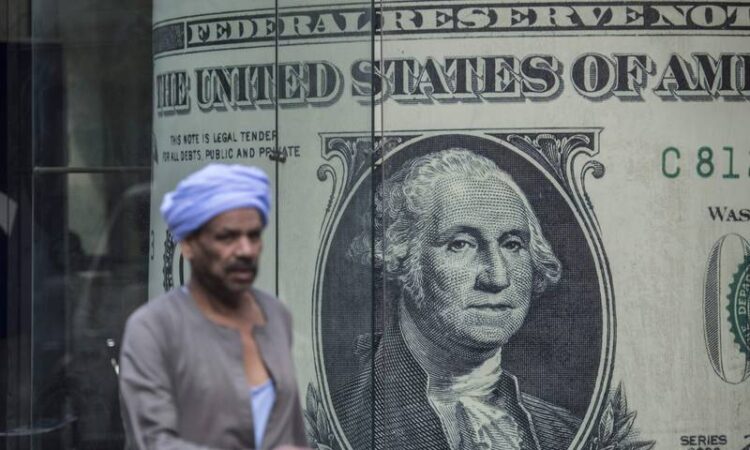
The Egyptian pound strengthened by about 25 per cent against the US dollar at the weekend, reaching 55 pounds on Monday after a low of more than 70 on parallel markets last week.
The rise has been celebrated in state media reports but is expected to be temporary as dollar traders and holders have only reduced transactions because of reports that a devaluation of the pound is imminent.
It was, in part, caused by a widespread state crackdown on currency and gold traders after repeated accusations by authorities that profiteering traders were driving up the exchange rate, a political economy professor at Cairo University told The National.
“Since the start of the year, there has been report after report of currency and gold traders being arrested and caught red-handed with large amounts of gold or dollars,” said the professor, who requested anonymity.
“I definitely think some of it is exaggerated, but the sheer number of arrests itself is a sign that the state is taking this very seriously.”
Speculation on social media and talk shows that a Gulf country is soon going to deposit $22 billion into Egypt’s central bank has raised hopes that the country’s woes will be eased by an influx of foreign currency into its official financial institutions, rather than the black market, the professor said.
Black markets don’t stay down for long. They will adapt to the crackdown
Political economy professor at Cairo University
Another factor was a statement from the International Monetary Fund (IMF), with which Egypt is in talks for another $3 billion in funding, that its delegation had made “excellent progress in discussions on the comprehensive policy package” during a visit that ended on February 1.
The IMF statement created anticipation that another devaluation of the Egyptian pound, the fourth since March 2022 and a key condition of the IMF loan, was imminent, the professor said.
“The drop we are seeing is mainly because black market traders and dollar holders are keeping their FX [foreign exchange] until they see where the devaluation and the crackdown are going to end up.”
Some black market traders confirmed that they had reduced operations significantly over the past week and were limiting transactions only to buying dollars from trusted sources.
Most have also halted selling dollars until the devaluation is implemented and the state crackdown ends, they told The National.
The pound’s new strength has not affected prices in Egypt. The cost of food, in particular, increased dramatically in January, and is continuing to rise.
This is because the crackdown has merely made people stop trading dollars, affecting the supply of foreign currency needed for further imports, according to the Cairo University professor.
“Food prices are going up because dollars for imports are being withheld by black market traders trying to figure out their next move,” he said.
“Supermarkets are selling their stocked supplies, which, because of supply and demand, are increasing in price as supplies dwindle.”
Although several international financial organisations, including HSBC and Goldman Sachs, are anticipating that the pound will be devalued by the end of March, the government has not said anything about the timing or extent.
“There are currently two main camps of economic experts advising the government. Some, like Naguib Sawiris, have come out in support of the government lifting its hands from the currency completely so it trades at the same rate as the black market,” the professor said.
“This is what you might call a neo-liberal approach.
“There is also a strong camp advocating for the crackdown on currency traders and a fixing of the exchange rate.
“Considering the latest round of arrests, it’s safe to say the government is going with the latter before the former.”
Part of the government’s approach is to scare dollar holders into depositing their dollars in banks and not giving them to us
Currency trader
The government has repeatedly said that the black market price for the dollar is exaggerated because of profiteering and is trying to bring down the parallel rate before unifying it with the official exchange rate.
“The plan is to reduce demand for dollars through making it risky for people to trade on the black market,” one black market trader said.
“If someone is caught, they will have their money confiscated, which seems to be working so far as a deterrent. I am getting a lot less clients than I was in December.
“Part of the government’s approach is to scare dollar holders into depositing their dollars in banks and not giving them to us.”
Neither the professor nor the traders expect the currency black market in Egypt to remain dormant for long, and predicted that the US dollar will rise again.
“Black markets don’t stay down for long. They will adapt to the crackdown,” the professor said.
“Sure, people will go to banks now while there is fear and uncertainty, but once the situation adjusts, I think they will go to the black market again.
“People need all the money they can get right now.”
Egypt’s Cabinet last week approved a motion to halt any new government projects until at least July, by which time a debt repayment of about $16 billion will fall due, according to central bank data.
Another $16 billion in loan repayments is due by the end of the year, which has left many Egyptians worried after the sharpest rise in prices since the economic crisis began in March 2022.
Updated: February 06, 2024, 3:16 AM



